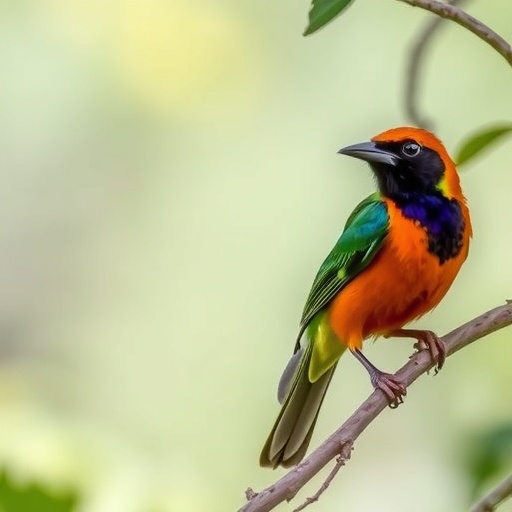In a groundbreaking study published in Scientific Naturalists, researchers have unveiled a critical connection between habitat degradation and immune function in tropical forest birds. The study, authored by T.I. Sorg, A. Hegemann, L. Cousseau, and their colleagues, delves deep into the implications of environmental changes for avian health, particularly focusing on nestlings as opposed to adults. This difference in immune response raises notable questions about the resilience of bird populations in declining habitats, potentially setting the stage for future conservation efforts.
Habitat degradation, particularly in tropical regions, is a pressing issue characterized by deforestation, urban development, and agricultural expansion. These factors lead to a reduction in biodiversity and can severely impact the natural behaviors and biological functions of various species. The present study highlights an alarming trend: as habitats become less suitable, the immune function of young birds, specifically nestlings, declines significantly, whereas adults appear to maintain their immune robustness, at least to some extent.
The researchers conducted a thorough investigation into the immune responses of tropical forest birds by examining both nestlings and adult specimens. By collecting and analyzing blood samples, they assessed various immune parameters, including the levels of specific antibodies and the activity of immune cells. Interestingly, the findings revealed that while adult birds showed relatively stable immune function, the nestlings—a critical life stage in a bird’s development—exhibited noticeably weaker immune responses in degraded habitats.
This disparity in immune function between different life stages suggests that nestlings may be more vulnerable to environmental stressors. Immune development is crucial during early life, and any impairment could have cascading effects on their survival and future reproductive success. If nestlings are unable to mount an effective immune response, they may become more susceptible to diseases and infections, jeopardizing avian populations long term.
Moreover, the study underscores the importance of nesting environments. The researchers found that nestlings raised in higher-quality habitats displayed significantly better immune responses compared to those from degraded areas. This observation leads to vital implications about habitat management and conservation strategies. Protecting areas with rich biodiversity and ensuring high habitat quality could serve as an essential factor in boosting the resilience of young birds against diseases and promoting overall population stability.
The study’s results also prompt discussions about evolutionary adaptations. Birds often evolve traits that enhance survival in their specific habitats. However, with rapid environmental changes, there is a significant risk that these adaptations may not keep pace, especially in sensitive life stages such as that of nestlings. This research opens avenues for further inquiry into how birds might adapt to ongoing habitat loss and what genetic or physiological factors might contribute to their ability to cope with such pressures.
One of the more striking elements of the study is the potential for implications beyond avian health. The findings may apply to other wildlife species, suggesting a broader pattern where young animals may bear the brunt of habitat degradation more acutely than adults. This insight could be pivotal in shaping conservation priorities, emphasizing the need to protect not just adult populations but also the vulnerable young that are integral to the sustainability of species.
As we confront global challenges like climate change and biodiversity loss, understanding the intricate connections between habitat quality and immune health in wildlife becomes even more vital. The research led by Sorg and colleagues provides compelling evidence of how environmental factors can dictate the health and survival of the next generation of birds, serving as a reminder of our ongoing responsibility to protect natural habitats.
The researchers advocate for more focused conservation strategies that prioritize the safeguarding of nesting sites and the habitats that support young birds. Creating and maintaining healthy ecosystems not only benefits wildlife but also contributes positively to human environmental health. As the study illustrates, the well-being of avian populations serves as a barometer of ecosystem health, indicating much more extensive implications for biodiversity conservation.
While the findings are significant, they also pave the way for future studies that can investigate other variables influencing immune responses in young birds. Factors such as diet, maternal effects, and exposure to pollutants may further elaborate on how habitat degradation affects avian health. Establishing a detailed understanding of these interactions is crucial in forming comprehensive conservation strategies.
Finally, the research serves as a call to action for both policymakers and conservationists. As the evidence mounts regarding the effects of habitat degradation on wildlife, there is an urgent need for collaborative efforts to address these challenges. Saving our forests and other vital ecosystems is not just about preserving aesthetic values; it is also about securing the future of the species that inhabit these environments. Such proactive measures are essential if we are to combat the escalating crises of biodiversity loss and environmental decline effectively.
In conclusion, the study conducted by Sorg, Hegemann, Cousseau, and others sheds light on a critical aspect of wildlife ecology, providing a nuanced understanding of how habitat quality affects immune function in nestlings, revealing a potential tipping point in avian populations that could have lasting repercussions. Identifying these links will be paramount in our efforts to protect biodiversity and ensure that future generations of both wildlife and humans inherit a healthier planet.
Subject of Research: The relationship between habitat degradation and immune function in nestlings and adults of tropical forest birds.
Article Title: Habitat degradation relates to reduced immune function in nestlings, but not adults, of a tropical forest bird.
Article References:
Sorg, T.I., Hegemann, A., Cousseau, L. et al. Habitat degradation relates to reduced immune function in nestlings, but not adults, of a tropical forest bird.
Sci Nat 112, 90 (2025). https://doi.org/10.1007/s00114-025-02046-3
Image Credits: AI Generated
DOI:
Keywords: habitat degradation, immune function, tropical birds, nestlings, environmental stressors, biodiversity conservation.




